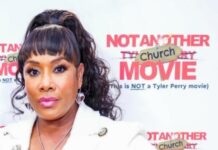
*Tony Award-winning director Kenny Leon marks his ninth Broadway play with the current revival of Mark Medoff’s “Children of a Lesser God.” The production stars acclaimed actor Joshua Jackson and Lauren Ridloff, who is making her Broadway debut. Leon was selected by the producers to revive what was conceived as an all-white production nearly 40 years since its first Broadway run.

“I have a multi-racial cast, and they all look like America to me,” said Leon. “And now the play works on four levels. It works across racial lines, class, hearing/non-hearing/hard of hearing, and it’s a beautiful production that talks about how in this country we don’t listen to each other. And when somebody’s different from us, we don’t listen. Blacks are not listening to whites, Democrats don’t listen to Republicans, husbands don’t listen to wives, and that’s what the production has evolved into. It’s a play for the entire family. It’s funny, it’s rich, and it’s timely.”

Leon’s forthcoming memoir, “Take You Wherever You Go,” will be released June 5, by Grand Central Publishing. “I talk about everything that I’ve done in my life, and explain how a country boy from Tallahassee, Florida, made it from Miccosukee Road to Broadway,” said Leon. “I talk about the three pillars of my life, which is my mother, my grandmother, and the teachings of the iconic August Wilson. I tie all of that together. I also talk about ‘The Wiz Live’ and ‘Hairspray Live’ and the nine Broadway plays I directed, and my outreach in the community with inner-city kids. I try to do all of it because it makes me a better human being and a better director.”
In this edition of “A Conversation on Creative and Culture,” Leon also talks about his longtime friendships with Angela Bassett, Samuel L. Jackson and LaTanya Richardson Jackson, among others; why he cast Sean Combs as Walter Lee Younger in “A Raisin in the Sun,” and his expanding career, not only in theater but television and film.

Gwendolyn Quinn: Tell us about how and where you grew up.
Kenny Leon: I was born in Tallahassee, Florida. My mom [Annie Ruth Holtzclaw] was turning sixteen when I was born, and by the time she was nineteen, it was three of us [children – Kenny Leon, Tony Leon, and Jackie Leon]. My mom left Tallahassee pregnant with my two-year-old sister. I was four when she went to South Central Florida to try to start a life there.

I was the oldest [child] and my mom left me with my grandmother [Mamie Wilson], out in the country in Tallahassee. We had no indoor plumbing. I grew up in the outhouse and enjoyed all the beauty of growing up in the country, which was great for me.
My grandmother was a great human being. We used to sit on the porch and wait for cars to go by. We would laugh at ugly cars and dream about the beautiful cars. I stayed with her until I was eight or nine years old, and then I went to live with my mother in St. Petersburg, Florida. By this time my mother had formed a life with my stepfather [Kenny’s other siblings: Donovan Holtzclaw and Julian Holtzclaw].

It was during that time I met Angela Bassett. She became a friend, and we were in Upward Bound, a college-prep program for low-income families who children had college potential but didn’t have the means to do so. I was in that program from ninth grade to twelfth grade.
We also took classes every Saturday on a college campus, and then during the summer, we took classes and participated in sports. At Upward Bound we had the opportunity to broaden our minds and we learned that anything was possible. That was a government program that worked because without that program, I don’t believe Angela Bassett or myself would have ever been able to go to college. We needed a hand-up, and that was the program that provided resources. Angela went to Yale, and I went to Clark Atlanta University. We remain great friends to this day.

In the African American community, we lived on the south side, and the white community lived on the north side. We were the first class to integrate the public schools in St. Petersburg, Florida. Angela went to Boca Ciega High School, and I went to Northeast High School. As African Americans, we were separated because we were dispersed to high schools all over town. Before that, all the black students mostly went to one high school.
GQ: Is Upward Bound still active?
KL: Yes. It’s privately supported now, so it’s not like it used to be in the ‘70s and ‘80s. Unfortunately, the country loses out on some extraordinary talent. But historically, the black colleges still perform a duty and are reaching young people whose dreams would not be met if it were not for the success of black colleges. I would say that most black people who are successful in this country, a large percentage of them attended black colleges and universities.
GQ: Tell me about your college years at Clark Atlanta University and living in Atlanta.
KL: Clark Atlanta University changed my world, and I saw that life had many possibilities. I met Maynard Jackson, who was the mayor of Atlanta; and Michael Lomax, who is now president [and CEO] of the United Negro College Fund. I saw people from all over the world, and I met some beautiful women at Spelman College, Clark Atlanta University, and Morris-Brown College.

During that time, I also met Samuel L. Jackson, who became a close friend, and his wife, LaTanya Richardson Jackson. At the time, they were all in Atlanta University Center and were my mentors.
In college, I started out as a political science major and ended up spending all my time in the theater department. I left undergraduate and went to law school [Southwestern Law School in Los Angeles], where I stayed for less than a year. Then I left law school and came back to Atlanta and started working with the Academy of Music and Theatre.
I had the opportunity to act in plays such as “Hamlet,” “Richard III,” and “A Raisin in the Sun.” I also worked in the prisons and taught inmates acting skills and learned a lot about them and their stories. I worked with People of the Bricks, a program with the homeless population.
After working as an actor for nine years. I started directing; once I directed that first time, that was the beginning of a wonderful professional life.

GQ: Tell me about your current Broadway play, “Children of a Lesser God.”
KL: “Children of a Lesser God” is a beautiful play by Mark Medoff. The play was presented on Broadway thirty-nine years ago, and it won a Pulitzer Prize and a Tony Award and then it became a film that starred William Hurt.
To prepare for the play, I thought I should take up sign language. Initially, I thought it was a love story between two people from different worlds, and the obstacle was that they couldn’t communicate. So I took lessons on the advice of a friend, Chris Robinson of Boston, who said, “You should take sign language from a person who is deaf since birth.” He recommended this woman, and I have to admit, in my prejudice, I said, “Well, a sign language teacher probably is going to be about sixty-five years old. She’s probably going to be white. She’s probably going to be boring. She’s probably going to be an introvert.” That’s just what I thought a sign language teacher would be.

I go into this restaurant and bar in Brooklyn, and there’s a woman sitting in the center of the bar, and she’s waving at me to come over. She was a beautiful thirty-six-year-old African American woman who looked like a model. We had a lesson that day in the bar. She taught me how to sign “eat” and “drink” and “coffee and “eggs.” She does not speak or hear, and yet we were communicating.
Once a week, we would meet at a public place to learn some sign language. After a year of taking lessons, I started to think that the play was different. The play was not a love story; it was the obstacle of communicating. And at that point, I looked at the play differently.
My sign language teacher was Lauren Ridloff, who I cast in the lead role in “Children of a Lesser God.” She has two beautiful kids who are deaf, and her husband who is an amazing poet, is deaf. Lauren is not an actor, but she is brilliant and charismatic. I put Viola Davis and Meryl Streep together, and I come out with Lauren Ridloff. She is fantastic in this production.
Once Lauren was on board, I cast Joshua Jackson of the “The Affair” and “Dawson’s Creek. Joshua and I always wanted to do something together on Broadway.

Beneath everything, “Children of a Lesser God” is a love story. Lauren [who plays Sarah Norman] and Joshua [who plays James Leeds] have good chemistry, and they look great together. Then I cast her mother, Mrs. Norman [Kecia Lewis] as an African American because there’s an offstage character, her father, who I assumed was white, so I cast her mother as black. And then I cast the lawyer in the play as a Korean American woman [Julee Cerda].

GQ: Before Broadway, the play premiered in the Berkshires [Massachusetts], correct?
KL: We did a tryout in the Berkshires, so I had most of it cast last summer. I’ve added Anthony Edwards, who was the lead on “ER,” but the production features most of the same company from the Berkshires.
GQ: At what point would you say you fell in love with theater and the arts?
KL: In the beginning, it was a hobby. Once I met Sam Jackson and his wife, LaTanya, and saw them onstage in a musical, “Dr. B.S. Black,” by Barbara and Carlton Molette, I was like, “Man, that’s fun, and they’re good, and who are they?” And then I met them; until that point, I didn’t know that there was a career as an actor. I didn’t see it as something that I could do professionally.
That’s where the seed was planted, but I didn’t know until after I went to law school. I left law school, and I said, “This is not what I’m supposed to be doing.” Once I started acting on a full-time basis, I had a choice to go back to law school or to continue working in the community and doing plays at night. At that time, I was a model doing ad work on billboards, and I was the Martell Cognac man for a while. Once I started doing that, I knew I had found my passion. It didn’t matter that I was making two hundred dollars a week.
GQ: When did you become interested in directing?
KL: When I was seven or eight years into acting at The Academy of Music and Theatre, which is a popular theater company in Atlanta. Sometime during the eighth year, I had an opportunity to direct a play called “The Wishing Place.” I did the play, and I was like, “This is it.” Before that, I was known as an actor and a pretty good actor.
The artistic director of the company said, “Kenny, I don’t think you have the skills to direct. I think you should return to this program as an actor. We’ll gladly pay you to come back next year as an actor but not as a director.”
That’s when I left that company, and a year later, I was approached by a woman who introduced me to the National Endowment Fellowship Program for Directors and Designers, and they chose me to be one of the fellows. Then I went to this program at Baltimore Center Stage in Maryland, studied for a year, and the year after that I was offered the position as the associate artistic director at The Alliance Theatre in Atlanta, which was the big theater I was trying to get into.
Two years later, I was named the artistic director of this fifteen-million-dollar institution. I headed the company for ten years. At The Alliance Theatre, I felt like I had diversified the theater, and introduced the company to great playwrights including August Wilson. Once I’d done that, I felt like it was time to leave. I was making $200,000 a year. It was a great job; and all of a sudden I resigned from that position.
Later that same year, I received an offer to direct my first Broadway play, “A Raisin in the Sun” and “Gem of the Ocean” on Broadway. I had two Broadway shows in the same season, which I could never have had if I’d still been running the large theater.
GQ: What’s new with your theater company, True Colors Theatre?
KL: I’m the artistic director of True Colors Theatre Company, one of a few African American theater companies in the country that embraces other cultures. We just finished doing August Wilson’s “King Hedley II,” directed by Jamil Jude. It was an amazing production. We are getting ready to do Colman Domingo’s “Dot,” which is about mental illness in the African American community. We are doing the production in June in Atlanta.

When my dear friend August Wilson died, we started this competition called “The August Wilson Monologue Competition,” and we started in one school in Atlanta, Georgia, and now we’re in thirteen states. We bring all the finalists to New York City during the week of August’s birthday, and they get to compete at the August Wilson Theatre, which is named in his honor. The inner-city kids, most of them haven’t been on a plane. Most of them have never been to New York City, except the New York finalists. And most of them have never met people like Denzel Washington or Samuel L. Jackson, so sometimes I find a way to introduce them to people like that.
On Monday, May 7, the finalists will compete and use the works from August Wilson’s ten plays. August wrote about the average person, the common man that leads the people. This is our eleventh year producing the event. We [True Colors Theatre Company] sponsor the event along with the August Wilson Estate.
In addition to the August Wilson competition, we produce four plays a year, and in the spring, we also produce The New Play Reading Series in Atlanta.

GQ: Of your nine Broadway productions, which show would you say had the greatest impact on your career as a director?
KL: I would say my first Broadway play, the 2004 production of “A Raisin in the Sun” with Phylicia Rashad, Audra McDonald, Sean Combs, Sanaa Lathan, and the late, great Bill Nunn.
“A Raisin in the Sun” introduced me to a broader audience. Up until that time, I had worked across the country at regional theaters in Boston, Chicago, Los Angeles, and Atlanta. But the first commercial show that put me on the map was when P. Diddy [also known as Sean Combs] did “A Raisin in the Sun.” I was blessed to have the opportunity to do it again with Denzel Washington, Sophie Okonedo, and LaTanya Richardson Jackson in 2014.

GQ: What made you decide to cast Sean Combs for “A Raisin in the Sun?”
KL: Truthfully, to get a Broadway show up, and sometimes African Americans have a hard time understanding this lesson, but to get a Broadway show up, it’s not about black, it’s not about white. It’s about green. So you need a star or somebody that people are curious about seeing.
When I was assigned to the production, I went out to every popular African American, age-appropriate actor. And all felt “A Raisin in the Sun” was an old play, and they weren’t interested in doing it commercially. So we were up against the wall. I said, “This play is a classic. It’s not old.” But nobody wanted to do it, so then I got a call from Sean’s acting coach [Susan Batson], and at the time, she was Nicole Kidman’s and Tom Cruise’s acting coach.
Susan called and said, “Kenny, I know you’re doing ‘A Raisin in the Sun.’ Would you be interested in seeing Sean Combs? I’ve been working with him, and I think he might have it in him.”
I said, “Susan, I am not against this because I can’t find anyone to do the role who can also help us sell tickets. I will see anybody that wants to audition for me.”
Susan said, “He’ll audition.” Puff came up and auditioned, and when he auditioned, I was honest with him. I said, “I don’t know why you would want to do this. You don’t need to do this.” We talked about our family. He talked about how his grandmother raised him; I was raised by my grandmother. His father left him early in his life; my [biological] father was not involved in my life. So we had a connection.
I said, “I can see you’re just as passionate about this play as I am.” I said, “You have the honesty and the authenticity of this character. You understand what it is to grow up poor, even though right now you’re not poor. But you understand that because you’ve been there. And, also, I think you understand the character, Walter Lee Younger. But I don’t think you have the technique, or the skill, or the craft to do it. The only way that I can see it being done is if you were to shut down your businesses and if we were to lock arms, I think together we could create a Walter Lee. But it’s going to involve a lot of teaching and a lot of focus.”
He appreciated my honesty. The producer was like, “Why are you telling him that?” I was like, “Because that’s the truth. He’s going to need to work at it.” And I admire his honesty, and we were honest with each other from the beginning. So we said, look, let’s go down this road together, and together we can make history.
We made a bond with each other. We spent eight hours of rehearsal together, and then he would go two hours to work with Susan. Then he would come and pick up me at midnight, and then we would go to a club or a restaurant until three or four o’clock in the morning and talk about the craft of acting and theater. He built a replica of the set for his Park Avenue home, just to get acclimated to Walter Lee. He tried to live like Walter Lee. I don’t know anybody who is going to work that hard.
You’re not going to outwork Puffy. He does everything that he can do to be as successful as he can. It taught me a lesson. I thought I was working and doing one hundred percent, and I realized after I met Sean, I now have another gear. So when I’m doing projects, I’m at one hundred and twenty-five percent. I think talented people can learn, take a lesson from that: Are you working as hard as you could work to become the best you can be?

When I look back at that production of “Raisin,” he was the best Walter Lee that he could be, and I thought he was brilliant in the role. And it was his take on it, but he worked hard.
GQ: Is “The Wiz” still coming back to Broadway? Are you still involved?
KL: The Broadway production fell apart because the lead producer for the stage production is no longer with Cirque du Soleil. I’m not actively involved right now.

GQ: Why do you think “Holler If Ya Hear Me” had a short run on Broadway? Are there any plans to revisit that project?
KL: We revisited the play last summer. We did it in Atlanta and had a successful run, and I expect that it will probably end up in major urban cities, and maybe over in Europe. Tupac is a lightning rod, either you love him and respect him, especially as an artist and a poet, and a thinker, or either you see him as representing some negative aspect of the gang culture.

I was talking to [Harry] Belafonte. I saw him one night. He and Dr. Cornell West came to see the show on Broadway and they said to me, “Man, we love the show.” I said, “I wished it had a longer run.” Belafonte said, “What are you talking about? You have to remember you’re presenting Afro-centric work on a euro-centric stage.”

Belafonte’s comment reminded me of my role as an artist and a director, and it is not measured in the length of the run of a show. It’s measured in presenting the show, and starting a dialog and conversation, and presenting opportunities for people of color, and to ask tough questions of American citizens.
Todd Kreidler was a fascinating and interesting writer for this project. Broadway has its own culture, and a lot of it is about generating money. Sometimes, it conflicts with introducing new audiences and new writers to the culture, but that’s an ongoing battle that we have to continue to fight. I love my colleagues in the Broadway community, but together we all have a lot to learn from each other, and a lot of growth regarding how we present a wider blanket of stories by a diverse group of writers. How do we engage diverse audiences?
Often people do Broadway because they want to say they are playing on the highest stage in American theater. Sometimes people want to run long enough to get that stamp of approval. This is a Tony Award-winning play, a Tony-nominated play, or a play that was on Broadway. Then you can take it around the world. Often producers are not looking for long runs. Trust me, any time a play or a musical makes it to Broadway, some artists and producers have put blood into the production to get it to that level. I’m always congratulating any group that makes it that far.

GQ: You mentioned that “Holler If Ya Hear Me” recently ran in Atlanta. Did you make any changes to the work?
KL: No. The play worked in New York and Atlanta. With the Atlanta production, the set was different because we approached it more visceral, and rougher, and more organic, and less glitzy. We didn’t have a spinning purple car on stage, because you can’t afford that on a regional theater budget. We had a different cast. We made some minor adjustments at the beginning of the story. We had the same songs that [Tupac Shakur’s mother] Afeni Shakur gave us the rights to use. One of the greatest things for me was when Afeni came to opening night of the Broadway production; she was standing in the lobby of the theater crying. She said, “Thank you, Kenny. You did my son right.” I’ll never forget that. She passed away a year and a half ago.
Presenting the show in Atlanta was in her honor because she spent a lot of time in Atlanta. I did her right, and I did her son right. The play wasn’t about Tupac; the play was about the challenges that young folks face trying to live and realize their dreams. I thought when people are introduced to the artist that is Tupac, they see life lessons for themselves. This is a cat who wrote songs every day. He wrote about life and community and love and women and respect and country and honor and spirituality. To end the musical with his song “Ghetto Gospel,” it was quite amazing. I believe the play will have many lives and will go on to inspire a lot of twenty- and thirty-year-old young people.
GQ: Did you have to get permission from Afeni Shakur to do “Holler If Ya Hear Me”?
KL: Correct. Eric Gold was the [lead] producer and holds the rights to the stage production. Eric produced the play in New York, but I had a close relationship with her, and she trusted me. She gave him the stage rights. I believe it’s for five years. Once those rights run out, I assume it will be back in the hands of the lawyers.
By the way, Chadwick Boseman did the original workshop of “Holler If Ya Hear Me” before he became a big success. He played the lead role, and I would love to see him come to the stage again.

GQ: Tell us your reflections on the second incarnation of “A Raisin in the Sun” on Broadway in 2014.
KL: “A Raisin in the Sun” has been special to me for many years. I’ve done this show like five or six times in Atlanta. I played the role of Walter Lee. I’ve directed it in Boston and Milwaukee, then got my first Broadway production in 2004, and ten years later, I had another opportunity to do it with Denzel Washington, Sophie Okonedo, LaTanya Richardson Jackson, and Anika Noni Rose. Scott Rudin produced it.
When I get an opportunity to do a play again, I always see it as a new play. I never remember anything about the previous production. I’m always exploring, “What does this play have to say to us today?” When I directed it in 2014 with Denzel, the fact that he wanted to play that role was exciting to me because, in the conception of it, the role was usually performed by a younger actor.
We also thought it was important to let the audience know that they can relate to a guy that has one opportunity to a dream. Today, if you’re thirty years old, you can mess up and get another opportunity at forty and have two or three dreams. We wanted to make that part of what Lorraine Hansberry wrote, like Walter Lee got one opportunity and how does he come back to that? How does he overcome that? He overcame it because he had the love and support of his family. I thought that play needed to be done with an older Walter Lee because he messed up the family’s money, or the family’s dream. It was crushing to know that he wasn’t going get another opportunity. I applaud Denzel for taking on that role, knowing that some people wouldn’t like the idea that an older guy played Walter Lee.
Sophie [Okonedo] played opposite of Denzel. LaTanya Richardson Jackson came in and played the mother. “A Raisin in the Sun” was nominated for five Tony Awards, and we won three. I also won my first Tony Award as a director.
GQ: Tell us about the television version of “A Raisin in the Sun” that you directed.
KL: “A Raisin in the Sun” was released [on ABC-TV] in February [25,] 2008, and featured the 2004 Broadway cast of Sean [Combs], Phylicia [Rashad], Audra [McDonald], and Sanaa [Lathan], and Bill [Nunn]. Neil Meron and Craig Zadan produced the television production.
We shot the production back in the day when the three networks [ABC, CBS, and NBC] were still doing movies of the week. We delivered close to ten million viewers, which was an extraordinary accomplishment at that time. That was also the last year the networks produced movies of the week. “A Raisin in the Sun” led to other opportunities for me to do live musicals on television. Through the success of that movie, I went on to direct “The Wiz Live” and “Hairspray Live.”

GQ: Did you pursue the television opportunities or did the network/producers come to you?
KL: The producers Neil [Meron] and Craig [Zadan] came to me. We had a great relationship and had been partners on several previous projects. We also produced an African American version of “Steel Magnolias” for television with Queen Latifah [also Jill Scott, Condola Rashad, Adepero Oduye, Phylicia Rashad, and Alfre Woodard].
We are slated to work on Aaron Sorkin’s “A Few Good Men,” which will be a drama for live television. It’s been fun working with Neil and Craig, who trust me as a director, and they believe in my artistry.

GQ: Let’s talk about “The Mountaintop” with Samuel L. Jackson and Angela Bassett.
KL: Samuel L. Jackson is one of my best friends. He’s also a mentor, and I probably don’t take on any job without talking to him first. When the offer came in for “The Mountaintop,” I mentioned it to him. We were on the golf course and I was telling him about the play. He had just arrived from London. He mentioned that he heard about the play in the U.K. I said, “I might do this play on Broadway,” and he said, “It sounds interesting.” I said, “I got to cast it. What do you think about that?” A week later he sent me a note and said, “Age-wise, do you think I could play Dr. King?” I said, “Absolutely. Dr. King never appeared to me to be a young guy.” I said, “That would be amazing.”

Once we had Sam in place, I approached playwright Katori Hall, and the producers were ecstatic. Then we looked at several women for the lead role. We cast Angela [Bassett], and the chemistry of those two on a Broadway stage was exciting.

GQ: Tell us about “Stick Fly.”
KL: “Stick Fly” was another example of Afro-centric stories being told on a euro-centric platform or Anglo-American platform. “Stick Fly” was another production in which you either had to have the money or the time to allow the new audience to get there, or you would need the time to educate the traditional audience that this is safe and good and okay. If you don’t have enough money or time, the production can’t have the life that you would imagine on Broadway. With “Stick Fly,” this was not a story about black families struggling and trying to overcome. It was not about slavery or civil rights; it was about upper-middle-class families who lived on Martha’s Vineyard and the challenges and the drama in their lives.

I love that it was about a different class of black people, and I love that it was a comedy. Lydia R. Diamond is a fantastic playwright. I met Alicia Keys earlier, and we became artistic partners on the production. She was one of the producers and lent her name, money, and support.

One of the joys was to have Condola Rashad in the show. I’ve known the family forever, so to be a part of Condola’s first Broadway show, that was important to me. I also was a part of her first television movie when she did “Steel Magnolias.” I did her first play, “Tambourines to Glory,” at my company, True Colors Theatre Company. I’ve done a lot of firsts with Condola. Now, she’s starring on Broadway in “Saint Joan” at the Manhattan Theatre Club.
GQ: What was it like working with Ruben Santiago-Hudson in “Stick Fly?”
KL: I love Ruben as an actor. He’s unique and one of a kind. It was important that he played that role. We’ve done a couple of projects together, and I directed him in “Gem of the Ocean” on Broadway. I will work with Ruben any time, any day.

GQ: Tell us about your relationship with August Wilson.
KL: August is one of the greatest artists that this country has seen. He has made the most significant contributions by writing ten amazing plays about Africans in America. To have been one of the many people that have been blessed by August Wilson is profound for me. If you take August Wilson out of American theater, then there’s a big hole in the soul of America.
There are a group of black actors that were among some of the first to be featured in August’s earlier works, such as Laurence Fishburne, Charles S. Dutton, Angela [Bassett], Samuel [L. Jackson], Denzel [Washington], and LaTanya [Richardson Jackson]. The great Lloyd Richards directed several of August’s plays, along with Marion McClinton and myself. August only worked with three directors, and I was one of those three.
GQ: Would you say that August Wilson was the most inspirational figure in your theater career?
KL: Yes. I’ve learned a lot from him, between him and the practical things I’ve learned from Sam Jackson.
GQ: How did you meet August Wilson?
KL: I went to see “Fences” on Broadway in 1987, and I was a directing fellow for the National Endowment for the Arts. At the time, I was the only black artistic director running a major institution. August had agreed to let me produce and direct his plays before they had finished running on Broadway. I produced all ten plays before anybody else.
GQ: Let’s talk about the August Wilson Century Cycle Plays at the Kennedy Center.
KL: I produced all ten of the plays. I came up with the idea and presented it to the Kennedy Center. I hired seven directors and forty-two actors. We did all the plays in rep for six weeks. From the 1904 play to the 1997 play, August did one play each decade, so we produced all of them at the Kennedy Center.
GQ: What’s next?
KL: I’m doing a very exciting world premiere of a new play with a big-name African American female artist in September, but I can’t say who it is.
GQ: What would you like people to know about Kenny Leon?
KL: I’m always trying to present great stories that matter to people. I want to encourage people to give live theater a shot. It is one of the most exciting places to receive stories.
One day I would love to see more of our major African American artists in one play together, on the same stage. That’s my dream.

Gwendolyn Quinn is an award-winning media strategist and consultant with a career spanning more than 25 years. She covers entertainment, travel, and lifestyle news. Quinn is a voting member of the Drama Desk. She is a contributor to NBCNews.com/NBCBLK.com, BlackEnterprise.com, HuffPost, and Medium.com, among others.
We Publish News 24/7. Don’t Miss A Story. Click HERE to SUBSCRIBE to Our Newsletter Now!





